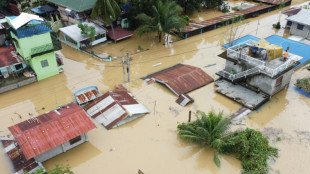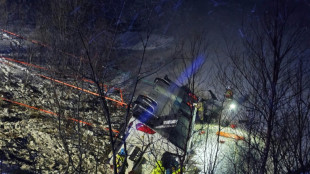
-
 China sanctions US firms over Taiwan military support
China sanctions US firms over Taiwan military support
-
World number six Rybakina makes winning start at United Cup

-
 Israeli strikes hit Yemen airport as WHO chief prepares to leave
Israeli strikes hit Yemen airport as WHO chief prepares to leave
-
Swiatek not expecting WADA appeal over doping scandal

-
 'Dangerous new era': climate change spurs disaster in 2024
'Dangerous new era': climate change spurs disaster in 2024
-
Fritz motivated for Slam success after low-key off-season

-
 Move over Mercedes: Chinese cars grab Mexican market share
Move over Mercedes: Chinese cars grab Mexican market share
-
Zverev aiming to challenge Sinner for top ranking

-
 N. Korean soldier captured in Russia-Ukraine war: Seoul
N. Korean soldier captured in Russia-Ukraine war: Seoul
-
Inspired Tsitsipas looking to 'refresh, regroup' in Australia

-
 Seahawks edge Bears to boost NFL playoff hopes
Seahawks edge Bears to boost NFL playoff hopes
-
Thunder NBA win streak at nine as Shai ties career high with 45

-
 India announces state funeral for ex-PM Manmohan Singh
India announces state funeral for ex-PM Manmohan Singh
-
Japan govt approves record budget for ageing population, defence

-
 Japanese shares gain on weaker yen after Christmas break
Japanese shares gain on weaker yen after Christmas break
-
South Korea's acting president faces impeachment vote

-
 Fleeing Myanmar, Rohingya refugees recall horror of war
Fleeing Myanmar, Rohingya refugees recall horror of war
-
Smith century puts Australia in control of 4th Test against India

-
 Israeli strikes hit Yemen as Netanyahu fires warning
Israeli strikes hit Yemen as Netanyahu fires warning
-
Peru ex-official denies running Congress prostitution ring

-
 Australia's Smith reaches 34th Test century
Australia's Smith reaches 34th Test century
-
NHL Red Wings fire Lalonde and name McLellan as head coach

-
 Injured Halep withdraws from Australian Open
Injured Halep withdraws from Australian Open
-
Liverpool power seven points clear, Man Utd crash at Wolves

-
 Leaders Liverpool survive Leicester scare to go seven points clear
Leaders Liverpool survive Leicester scare to go seven points clear
-
Membership of UK's anti-immigration Reform party surpasses Conservatives

-
 Two dead in treacherous Sydney-Hobart yacht race
Two dead in treacherous Sydney-Hobart yacht race
-
Amorim warns of 'long journey' ahead for miserable Man Utd

-
 Three dead, four injured in Norway bus accident
Three dead, four injured in Norway bus accident
-
Man Utd fall to Wolves as Fernandes sees red

-
 Fernandes sent off as Man Utd crash at Wolves, troubled Man City held by Everton
Fernandes sent off as Man Utd crash at Wolves, troubled Man City held by Everton
-
'Logical' that fatigued Spurs are faltering - Postecoglou

-
 Manmohan Singh: technocrat who became India's accidental PM
Manmohan Singh: technocrat who became India's accidental PM
-
India's former PM Manmohan Singh dies aged 92

-
 Acid risk contained in deadly Brazil bridge collapse
Acid risk contained in deadly Brazil bridge collapse
-
Chelsea stunned by Fulham in blow to Premier League title hopes

-
 Troubled Man City held by lowly Everton, Chelsea title bid rocked
Troubled Man City held by lowly Everton, Chelsea title bid rocked
-
Paterson, Bosch give South Africa edge over Pakistan in first Test

-
 Oil leak in Peru tourist zone triggers 'environmental emergency'
Oil leak in Peru tourist zone triggers 'environmental emergency'
-
Mozambique post-election violence kills 125 in three days: NGO

-
 Finns probing ship from Russia for 'sabotage' of cables
Finns probing ship from Russia for 'sabotage' of cables
-
Williams hits unbeaten 145 as Zimbabwe make Afghanistan toil

-
 Bowlers bring Pakistan back into first Test in South Africa
Bowlers bring Pakistan back into first Test in South Africa
-
Banbridge foils French to land King George VI Chase for Ireland

-
 Man City pay penalty for Haaland miss in Everton draw
Man City pay penalty for Haaland miss in Everton draw
-
Paterson takes five wickets as Pakistan bowled out for 211

-
 Kremlin cautions on 'hypotheses' over plane crash
Kremlin cautions on 'hypotheses' over plane crash
-
Pakistan military convicts 60 more civilians of pro-Khan unrest

-
 Turkey lowers interest rate to 47.5 percent
Turkey lowers interest rate to 47.5 percent
-
Syria authorities launch operation in Assad stronghold


Manmohan Singh: technocrat who became India's accidental PM
Manmohan Singh's father may have believed his bookworm son would one day lead India, but the understated technocrat with the trademark blue turban, who died Thursday at the age of 92, never dreamed it would actually happen.
Singh was pitchforked into leading the world's largest democracy in 2004 by the shock decision of Congress leader Sonia Gandhi to turn down the role after leading the party to an upset win over the ruling Hindu nationalists.
He oversaw an economic boom in Asia's fourth-largest economy in his first term, although slowing growth in later years marred his second stint.
Known as "Mr Clean", Singh nonetheless saw his image tarnished during his decade-long tenure when a series of corruption cases became public.
As finance minister in the early 1990s, he was hailed at home and abroad for initiating big-bang reforms that opened India's inward-looking economy to the world.
Known as a loyalist to the Gandhi political dynasty, Singh studied economics to find a way to eradicate poverty in the vast nation and never held elected office before becoming PM.
But he deftly managed the rough and tumble of Indian politics -- even though many said Sonia Gandhi, the Italian-born widow of the assassinated Rajiv Gandhi, was the power behind the throne.
- Streetlight studying -
Born in 1932 in the mud-house village of Gah in what is now Pakistan, Singh moved to the holy Sikh city of Amritsar as a teenager around the time the subcontinent was split at the end of British rule into mainly Hindu India and Muslim Pakistan.
His father was a dry-fruit seller in Amritsar, and he had nine brothers and sisters.
He was so determined to get an education he would study at night under streetlights because it was too noisy at home, his brother Surjit Singh told AFP in 2004.
"Our father always used to say Manmohan will be the prime minister of India since he stuck out among the 10 children," said Singh. "He always had his nose in a book."
Singh won scholarships to attend both Cambridge, where he obtained a first in economics, and Oxford, where he completed his PhD.
He worked in a string of senior civil posts, served as a central bank governor and also held various jobs with global agencies such as the United Nations.
Singh was tapped in 1991 by then Congress prime minister P.V. Narasimha Rao to reel India back from the worst financial crisis in its modern history -- currency reserves had sunk so low the country was on the brink of defaulting on foreign loans.
Singh unleashed sweeping change that broke sharply with India's Soviet-style state-directed economy.
- 'History will be kinder' -
In his first term he steered the economy through a period of nine-percent growth, lending the country the international clout it had long sought.
He also sealed a landmark nuclear deal with the US that he said would help India meet its growing energy needs.
But by 2008 there was growing disquiet among the ruling alliance's left-leaning parties about the pact, while high inflation -- notably food and fuel prices -- hit India's poor hard.
Still, voters remained drawn to his calm, pragmatic persona, and in 2009 Congress steered its alliance to a second term.
Singh vowed to step up financial reforms to drive economic growth, but he came under increasing fire from critics who said he had done nothing to stop a string of corruption scandals on his watch.
Several months before the 2014 elections, Singh said he would retire after the polls, with Sonia Gandhi's son Rahul earmarked to take his place if Congress won.
But Congress crashed to its worst-ever result at that time as the Hindu-nationalist Bharatiya Janata Party, led by Narendra Modi, won a landslide.
More recently, an unflattering book by a former aide titled "The Accidental Prime Minister" portrayed him as timid and controlled by Sonia Gandhi.
Singh -- who said historians would be kinder to him than contemporary detractors -- became a vocal critic of Modi's economic policies, and more recently warned about the risks that rising communal tensions posed to India's democracy.
T.Batista--PC
